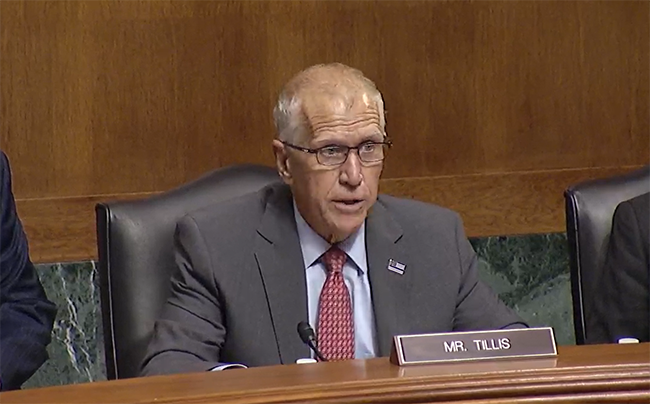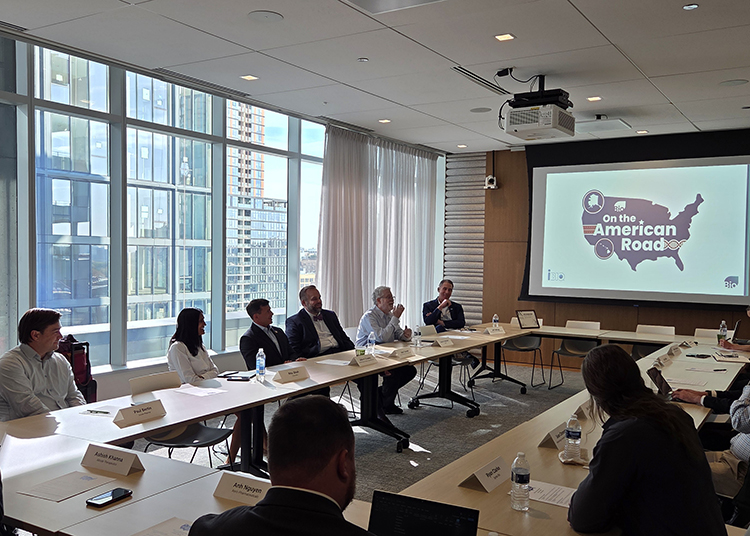Legislation establishing clear rules about the kinds of ideas that can be patented would support innovation in biotech and other fields by eliminating ambiguities introduced through court decisions, lawmakers and witnesses said in an Oct. 8 Senate hearing.
The Patent Eligibility Restoration Act (PERA) is essential to maintaining America’s leadership in innovation and intellectual property, Sen. Thom Tillis (R-NC) chair of the Senate Judiciary Subcommittee on Intellectual Property told his subcommittee’s hearing on “Restoring Clarity, Certainty, and Predictability to the U.S. Patent System.”
“The long overdue need for patent eligibility reform is one that, if left unaddressed, will cede America’s well-earned title of global innovation leader and global intellectual property rights leader,” Sen. Tillis warned. “Foreign governments like the CCP are actively working to undermine our IP system and they’re attempting to overtake America’s position as the global IP leader.”
The Biotechnology Innovation Organization BIO also supports PERA and praised the bill when it was introduced in May.
“PERA will finally clarify which inventions are eligible for patent protection. The existing uncertainty—created by a series of Supreme Court decisions—undermines researchers’ cutting-edge work and makes it harder for American innovators to invest in R&D,” BIO said. “At a time when the American people are demanding that critical industries be brought home, we cannot afford to place our innovators at a disadvantage with overseas competitors.”
While a couple of witnesses in the Oct. 8 Senate hearing said there was no need to pass PERA, they gave no clear reasons for their opposition to the bill, according to Dr. Hans Sauer, BIO’s Deputy General Counsel and VP for IP.
“Basically, their arguments were: we just don’t like patents,” said Sauer. “They represent people looking for a quick win through litigation, and they don’t care about how these patents get wiped out.”
Why PERA is needed
By providing a simple list of the types of ideas that are not patentable, PERA would make it clear what types of ideas can be patented, reversing confusion caused by a few court rulings.
A series of highly criticized Supreme Court decisions, in particular Mayo vs. Prometheus In 2012, broadened the types of inventions that could be exempt from patenting, making IP protections more difficult to obtain, even for technologies that have historically been uncontroversial. The confusion sowed by these decisions continues to spawn unnecessary litigation.
Under the current unclear interpretation of the law, real-world technological advances have been dismissed as mere abstract ideas not worthy of patent protection, according to Sauer.
“Production cell lines, diagnostic fetal tests, garage door openers and automotive axle assemblies—these things aren’t mere abstractions, and they don’t grow on trees.”
Judges have said they don’t want to be parsing these issues and they prefer to have legislation that eliminates ambiguities. Having no choice but to uphold the Supreme Court’s decisions, concerned federal judges urged Congress to address the resulting uncertainty through clarifying legislation, according to a study by the Congressional Research Service (CRS).
PERA would address this need by spelling out what types of ideas are simply inadmissible for patenting—a short list that includes an unmodified gene as it exists in the human body or an unmodified natural material as it exists in nature. Other biological materials and processes would be patentable if they otherwise meet the normal requirements for a patent.
Senators eager to move on the issue
The Senators heard from two panels of experts, including two former directors of the U.S. Patent and Trademark Office (USPTO), explaining why clarity is needed in patent eligibility.
Summarizing some of the testimony, Sen. Chris Coons (D-DE) observed that “Uncertainty in patentability threatens innovation in a way that creates a national security threat.”
Sen. Coons, who co-sponsored PERA with Sen. Tillis, said the issue of shoring up patent protections is one area that both parties can agree on.
“Finding bipartisan agreement on patent reform is a critical undertaking for this subcommittee, and for the committee as a whole. I’m grateful to continue on this journey with Sen. Tillis, with whom we held a hearing on this exact subject—I think with 45 witnesses—now quite a few years ago,” Sen. Coons said.
Another co-sponsor, Sen. Mazie Hirono (D-HI) also noted that patent eligibility reform has been long in coming, and expressed frustration with the lack of help from the Supreme Court.
“Appeals to the Supreme Court to remedy this situation have fallen on deaf ears,” she said. “The court actually engaged in writing legislation when they did their decisions that created this chaos, in my opinion. So here we are with a bill that would create some level of certainty into a system that I think is really important.”
Sen. Tillis also expressed his own eagerness to make progress.
“I hope that this is our last IP subcommittee hearing on this topic and that we will soon move to a markup in this Congress,” Sen. Tillis said.




